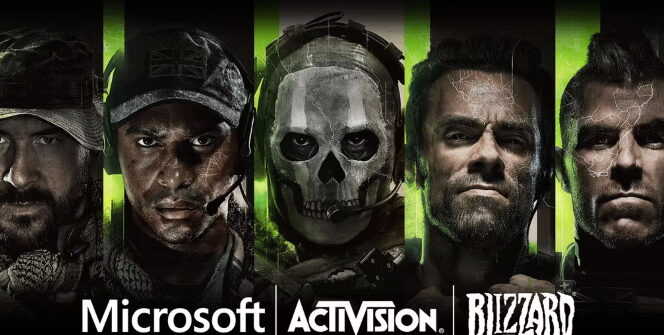Nvidia GeForce Now and Boosteroid have spoken out against the decision of the UK Competition and Markets Authority, the CMA.
The CMA’s decision does not allow Microsoft to close the nearly $70 billion deal that would give it the Activision Blizzard King. In response, GeForce Now posted on Twitter that they see a potential revolution in cloud gaming that could be made possible if the deal goes through and that, together with them, several cloud providers could make a much deeper range of games available. Boosteroid also disagrees with the CMA’s decision, and the company agrees with Brad Smith, Microsoft’s president, hoping that the matter will be resolved quickly.
Florian Mueller (who we wrote about recently), who previously called Sony’s trademarks and patents childish, has spoken out: “The CMA is not preventing something that would damage competition but is shielding a market leader from the competition and preventing a serious challenger to Apple’s and Google’s mobile app stores from emerging. The CMA has now lost its reputation as a reasonable regulator.” But we have to agree with the CMA that the Nintendo Switch is “technically incapable” of running Call of Duty games. That’s why Nintendo may show up at Gamescom in late August.)
Smith was a guest on the BBC’s Wake up to Money podcast, and he thinks the CMA’s decision will hurt Britain: “Unfortunately, I think it’s bad for Britain. The business community, the investment community, and the technology sector around the world have been following this case, and the strong message the CMA has sent is not just to surprise everyone who fully expected this acquisition to be approved but to send a message that I think will discourage innovation and investment in the United Kingdom. In that sense, the impact of this decision is far broader than on Microsoft or this acquisition alone.
Unfortunately, the impact on the UK is to shake the confidence among the business community in the UK and the CMA as a regulatory agency. When we study the decision, in part, it’s based on what we feel is such a flawed or just faulty understanding of the market. It’s all about a potential concern about what can become the cloud streaming of games. Still, this business is so small today that Microsoft can’t even stream games to more than 5,000 people at a time in the United Kingdom. And so for regulators to step in and seek to torpedo a 68 billion dollar global transaction out of a concern about a part of the business that is so small and to reject so many proposals to try to address their concerns, I think it leaves people worried.
Almost every aspect of the numerical factual analysis, from the market share estimate to the size of the market to just an understanding of how the cloud technology works, is, in our view, fundamentally flawed and incorrect. But second, the whole basis for this concern is the possibility that Microsoft would buy a gaming studio and not make the games it purchased available on alternative cloud streaming services. And yet we have already signed contracts to make these games available on alternative services. They’re not available today. We offered to commit to a 10-year binding undertaking to the CMA, as we have in Brussels, to save and provide these games for a decade on alternative services. What Microsoft offered to the CMA was a commitment that these very games we are acquiring would be available from services that Microsoft does not run; Microsoft does not sell them. They would be available on other computer operating systems and other devices. Not those from Microsoft. We think that’s good business because that’s how the games would be distributed as broadly as possible. That’s good for gamers. I don’t think the consumers of Britain benefit by stopping access to more games on more platforms through more services. And that is exactly what we have offered to do,” said Smith, who told UK Prime Minister Rishi Sunak that it’s worth taking a deeper look at the CMA’s role in the country.
CMA chief Sarah Cardell responded: “This decision shows how important it is to support competition in the UK, and the UK is open for business. We conducted a lengthy, in-depth investigation that took six months, and Microsoft had ample opportunity to put their case to us. We decided based on a huge amount of engagement. We reviewed over a million documents to reach our final decision.”
Bobby Kotick, CEO of Activision Blizzard King, also spoke: “I was surprised to learn that Lina Khan and the head of the CMA met a week and a half ago in Washington. You know, legally, you’re not supposed to be discussing active litigation. I don’t know that they did. I think that you’re seeing now that the CMA is being used as a tool by the FTC to create these kinds of outcomes, and if this isn’t the way that they’re supposed to be operating.” One FTC person at the hearing reportedly says there was no talk of a Microsoft takeover. Another spokesman, Douglas Farrar, who was not there, responded: “The FTC did not collude with the CMA or any other international regulator on any proposed merger review. Independent antitrust regulators can simply make their judgments when a deal appears blatantly anti-competitive. [The FTC] has, for decades under both Republican and Democratic Chairs, a practice long welcomed by the business community. But we never outsource our authority.”
But the CMA’s ruling mentions that “We have also been conscious of the international context and have consulted with other competition authorities, including in the EU and the US.” And the FTC’s regulations include this sentence, “US and foreign competition authorities may cooperate in investigating cross-border conduct that has an impact on U.S consumers,” the Microsoft acquisition would affect them…
Source: WCCFTech, WCCFTech, PSU















Leave a Reply